Text
Does anyone, by any chance, have any quotes from George Lucas talking about The Sith or The Emperor's ultimate goal?
I can't find the exact quote but I think he said that Sidious' goal is to rule the galaxy, allow his apprentice to challenge him when the time is right (be it Vader or Luke had he turned to the Dark Side) and allow his apprentice to strikes him down.
58 notes
·
View notes
Text
vimeo
Rewatching this scene for the sweet angst, something struck me. In hindsight it's extremely obvious but I'd never thought about it this way.
There's the very obvious parallels with Qui-Gon's death, down to Satine caressing Obi-Wan's cheek, there's that amazing bit of mirrored exchange, where Obi-Wan starts off confrontational and angry and Maul gloating, and then Obi-Wan becomes soft-spoken and empathetic and Maul starts to shake with rage and pain and can't even properly face him, and then there's this.
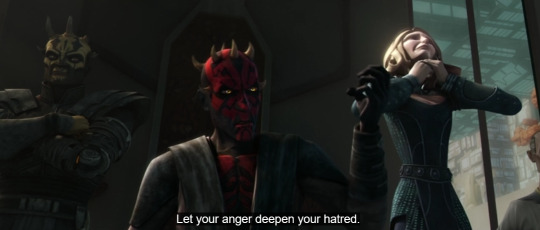
Maul boasts that the Dark Side is "more powerful than [Obi-Wan] knows," that Obi-Wan's "noble flaw" is a weakness, so why is he trying to make him more powerful? Why tell him to use the Dark Side? Why basically give him a crash course about how it works? Does he want Obi-Wan to retaliate? To escape?
The obvious answer is that Maul isn't trying to make Obi-Wan more powerful. After all, he's well aware that Obi-Wan is a dogshit fighter when he's angry.


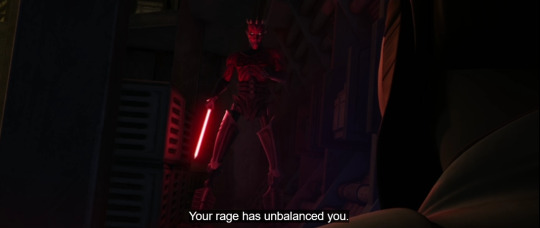
Immediately after that last quote, he says "that is not the Jedi way, is it?" as a taunt, and again in The Lawless, he insists "You should have chosen the Dark Side, Master Jedi."
So he's simply trying to destroy him as a Jedi, right? Because he knows that's what make Obi-Wan who he is, and he blames Obi-Wan for robbing him of his status along with his life, so he wants to destroy Obi-Wan's life in the ways that matter (since, as Obi-Wan says, just killing him is nothing like destroying him). But if that's the case, then we're back to the "power" issue. What's the point of destroying Obi-Wan if it's by giving him what Maul claims is his own identity, and the key to freedom?
And imo the answer lies right here:
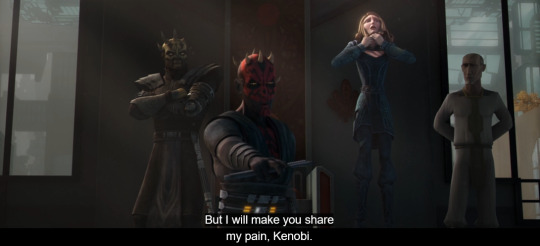
Why would killing Satine make Obi-Wan share Maul's pain? Why would Maul regard the pain of losing a loved one (something he's completely unfamiliar with at this point) as equal to his torment? Why isn't he chopping Obi-Wan in half and keeping him alive with Nightsister magick instead?
I think he really isn't talking about Satine's murder in and of itself when he talks of pain. The pain he wants Obi-Wan to share isn't the pain of loss, but very simply the pain of living in the Dark Side.
That's why Satine really is just a "tool" to his vengeance, as he says, and not the main point. That's why he's so enraged that Obi-Wan insists on showing him compassion even through his fear and anger - being kind leaves you open to grief but protects from the agony of the Dark.
Maul wants Obi-Wan to Fall, to stop being a Jedi, not because he truly believes the Dark Side gives you good things, but because he knows the Dark Side makes you miserable.

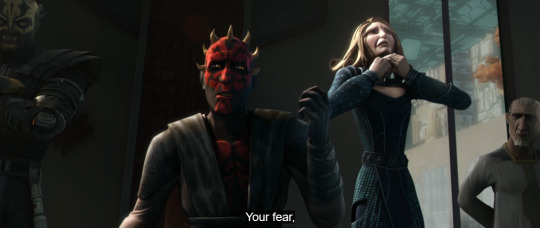
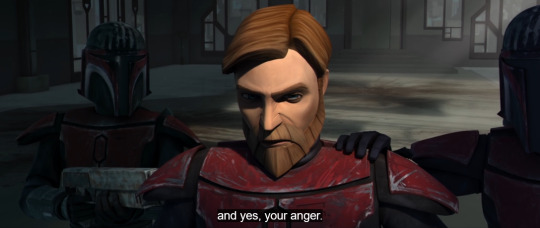

He tries to freaking teach Obi-Wan how to Fall, like Obi-Wan is a Sith apprentice, because being a Sith is the most miserable you're ever going to get! He tries to make Obi-Wan suffer by making him like him! He's so self-loathing his hatred of Obi-Wan materializes as self-hatred!
And hey, that greatly complements the end of the episode - Obi-Wan resists the Dark Side and escapes the planet, and Maul revels in it and immediately loses the only person he cares about and ends up crawling and crying while Sidious gleefully tortures him. Maul falls victim to every form of suffering he wanted to inflict on Obi-Wan and Obi-Wan flies away. In the end, Maul is proven right: being Fallen really f*cking sucks.
Really accentuate that Maul wanted relief above all when he sought out Obi-Wan in Rebels. He went to the only person who had shown him actual compassion, and the person he knew was best at resisting the Dark Side - so he could finally be free.
231 notes
·
View notes
Text
What the Prequels are about...
Some dude on YouTube: The Prequels are all about how a group of high-and-mighty monks tried to force a child to purge himself of emotions, and pushed him to the point where he broke and killed them all. That was the point of the prequel trilogy: the Jedi's failure. Their failure with Anakin, and the fact that they had fallen from what they were supposed to be, which made them vulnerable to being blinded and manipulated by the Sith.
Me: *looks at the Lucas quotes*
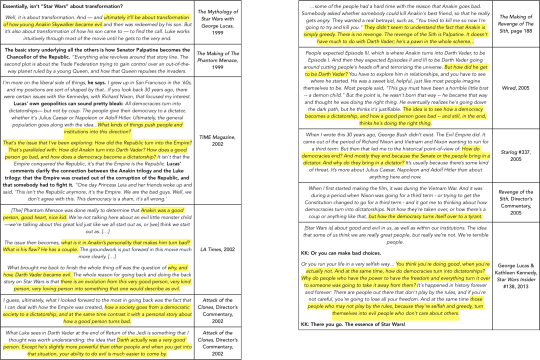
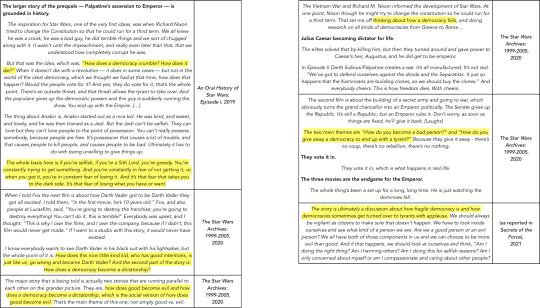
577 notes
·
View notes
Text
What's 'Star Wars' about?
A while ago I got an 'Ask' that concluded with "what is Star Wars about, if not the Jedi, right?" And weirdly enough... I have to disagree.
I mean... to me? Yes. Star Wars is about the Jedi. A Jedi-less, Sith-less, lightsaber-less Star Wars movie or series will struggle to get me on board (which is why I was surprised that I loved Andor so much).
But if you read everything George Lucas said, if you think about the Jedi's place in his two trilogies... they're not front and center, right?
Sure, there's Luke Skywalker... but he's a learner, in the Original Trilogy. Same goes for Anakin Skywalker and Obi-Wan Kenobi, in the Prequels. They're going through character arcs.
Otherwise, the Jedi are either used as mentors to the protagonist...

... or to deliver exposition...
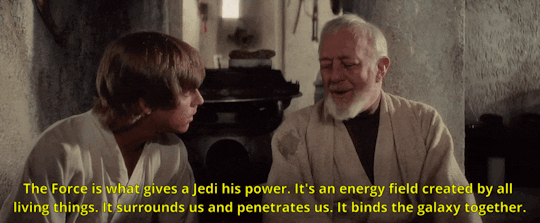
... but they're mostly vectors Lucas uses to present his thesis.
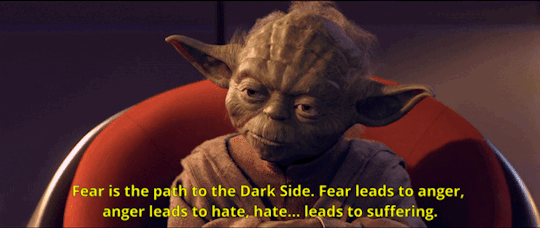
Functionally-speaking, the Jedi are important in that they embody the Buddhist philosophies the movie's themes are based on.
But when it comes to the plot, they're secondary. That's because the the themes of these films are bigger than the Jedi themselves.
So the question becomes... what's are the themes?

The primary goal of the Star Wars films is to inspire kids to start thinking outside the box and teach them a set of values and psychological motifs that have been passed down through mythology and fairy tales.
These values can be summed up in the dichotomy between greed and compassion / selfishness and selflessness / pleasure and joy.
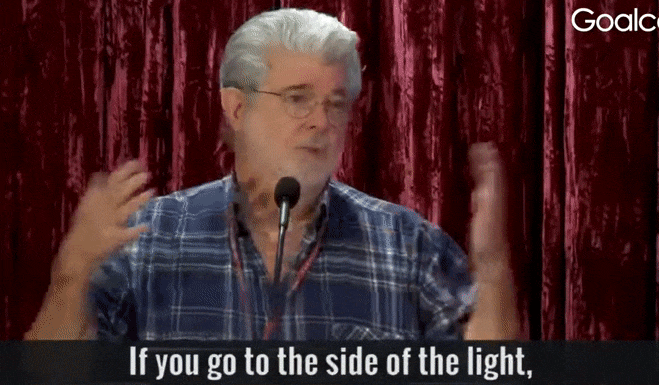

We all have both aspects and need to strike a balance between the two. After all, being greedy ultimately comes from fear and being afraid can happen to all of us. Problem is, unchecked fear can lead to anger, hate and a whole lot of suffering.
The more selfish you are, the more you want things and the more you're afraid that you'll lose everything you have, you'll get angry when someone tries to take it and that will hurt everyone around you.
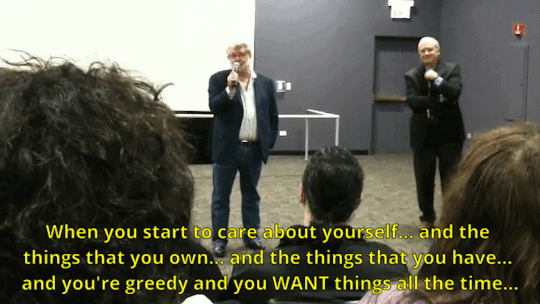
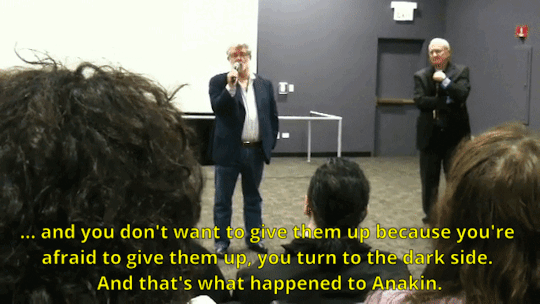
In other words, fear is the path to the tempting/addictive Dark Side.
Thus, seeing as we'll be inevitably tempted by the Dark Side and give in at some point (because nobody's perfect), we should aim to be as selfless and compassionate as possible for our own good... but also for the greater good, because we're all connected to a life energy. You can call it Qi or God; in Star Wars it's known as the Force.
As such, we all form a symbiotic circle and working with that in mind is better than putting ourselves first and draining from everything and everyone around us.
But we also need to be careful because there will be people who give in to that selfish side and will try to control everything. When the time comes, we must stand up for what's right.
So that's Lucas' thesis.
If I had to sum them up, the six movies illustrate it as follows:
The Prequel Trilogy is about the consequences of greed, explored through Anakin on a smaller scale and the Senate on a larger one.
The Original Trilogy shows the triumph of compassion, through Luke, Leia & Han and the Rebellion's fight against the Empire.
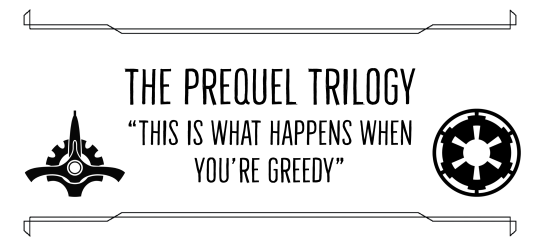
Lucas talked about it multiple times, the Prequels are about how Anakin becomes Darth Vader and how the Republic becomes the Empire, and in both those cases, it happens because they're greedy.
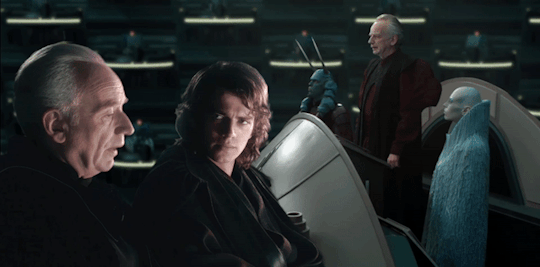
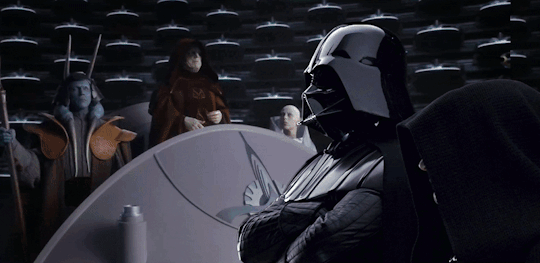
The Senate is greedy in the more classical sense. They could give a shit about "symbiosis", no they're taking bribes, letting corporations dictate policy, using loopholes to keep themselves in power and halting any meaningful progress out of fear that the new status quo will conflict with their own self-serving goals.
Anakin's greed manifests in a different way. He turns to the Dark Side because of his attachment. He wants to stop Padmé from dying... but not because he wants to save her, rather he wants to save himself from feeling the pain of loss again and will do anything to not have to live without her, her own wishes and the natural cycle of life and death be damned.
In both cases, they cave under pressure orchestrated by Palpatine, but nobody puts a gun to their head. They make a deliberate choice that comes from a selfish place, and neither one takes personal responsibility for it, they blame others, the Separatists in the case of the Senate and the Jedi in Anakin's case.
The Republic becomes an Empire with thunderous applause, betraying the people it was meant to protect.
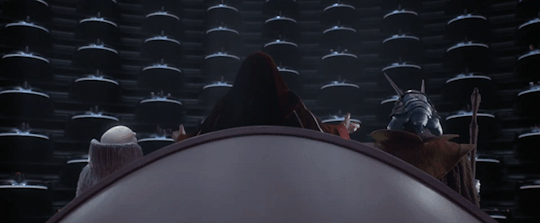
And when faced between doing something he knows is right and giving in to his selfish desires...
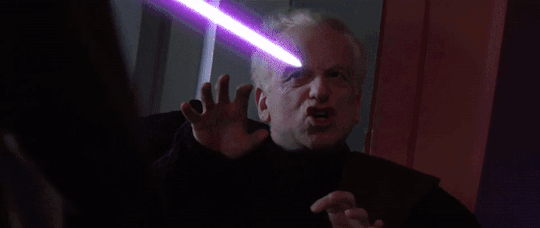
... Anakin elects to do the latter, thus betraying his family and leaving the Force in darkness.
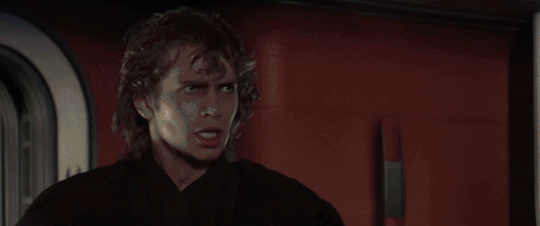
These selfish choices impact the galaxy as a whole, including the only characters in the trilogy who were doing their best to be compassionate and live in symbiosis: the Jedi, Padmé and Bail.
These champions of the Light Side are stuck playing catch-up or helplessly witnessing the events unfold, throughout the trilogy. They're playing by the rules and Palpatine uses this to his advantage.
Thus, as the galaxy tears itself apart because of Palpatine's manipulations, the Jedi and Bail are ignored and gradually weakened until they're either rendered irrelevant or killed.
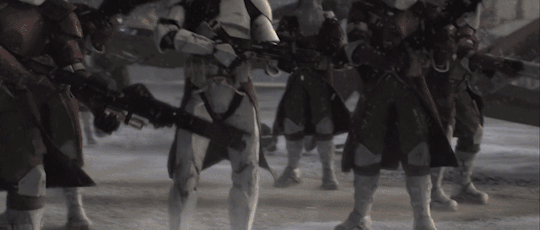
A new order is born, one built on blood, lies and greed: the Empire.
But a new hope remains.
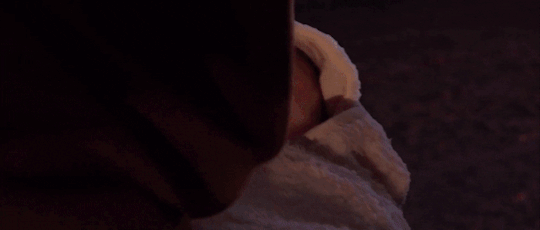

While before, the Jedi and people like Bail stood alone as everything around them became willfully corrupt... now, a Rebellion inspired by their legacy has banded together to overthrow the current order. But they don't fight for power or personal glory, they fight for altruistic, compassionate reasons. There's a sense of general responsibility that moves them, they're all doing their part.
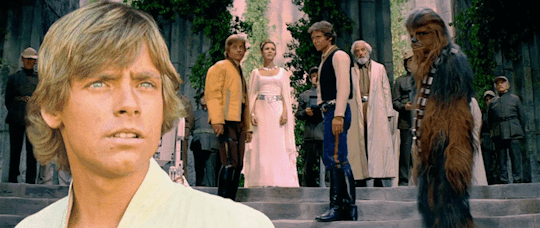
On a larger scale, we focus on the Rebels, who are tired of seeing people suffer and decided this needs to stop. They have gone from being passive, to proactive.
On a more personal scale, we see the evolution of Luke, from naive farmer to a hero, and guess what? More and more selfish people - like Han or Lando - are inspired to join the Rebellion, after seeing the exploits of Luke, Leia, or even Ben.
It all culminates in the final film, wherein:
The Rebels band together with the Ewoks - literal teddy bears whom the Empire, in their arrogance, never even considered to be a threat - to destroy the Second Death Star and free the galaxy from imperial tyranny.
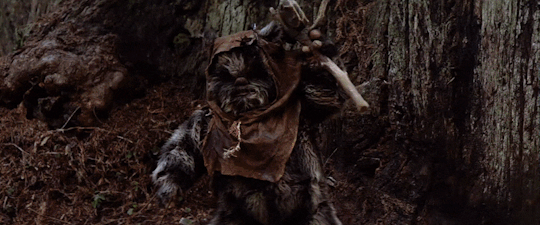
At the same time, Emperor Palpatine pressures Luke, who is tempted by the Dark Side like his father was.
But instead of giving in to his selfish desire to kill Darth Vader for all the horrors he's done...
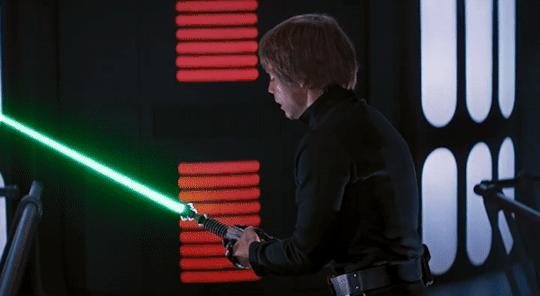
... he finds the strength to rise above it, instead showing compassion for his father, which, in turn, inspires Anakin to do the same.
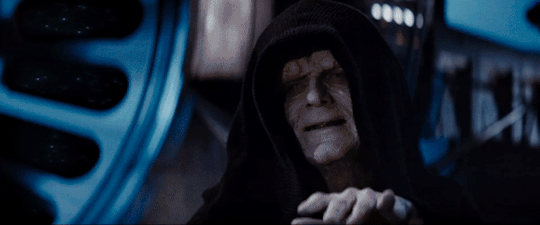
He faces a choice, like he did in Palpatine's office, two decades prior...
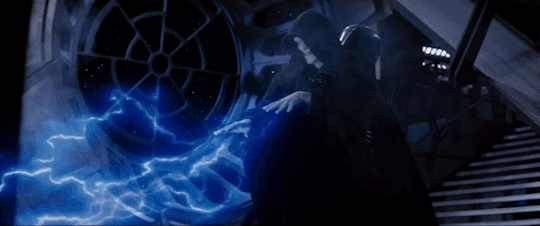
... and this time he chooses right.
Children teach you compassion. Anakin lets go of his fear and anger, and saves his son at the cost of his own life, finally bringing balance back to the Force.
Good triumphed over evil. Its champions achieved victory by being selfless, hopeful and fighting together / helping each other.


And that's it, that's how the movies thematically tie together.
As you can see, the Jedi aren't that directly impactful on the overall plot, because it revolves around Anakin, Luke and the respective factions/institutions around them.
But what the Jedi do bring to the table is their ability to teach and inspire others, both in-universe and out. They're spiritually impactful.
The Jedi are the epitome of compassion, and it's partially through them that George Lucas teaches his values to the audience.
702 notes
·
View notes
Text
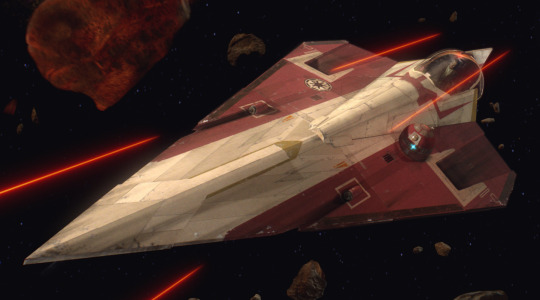
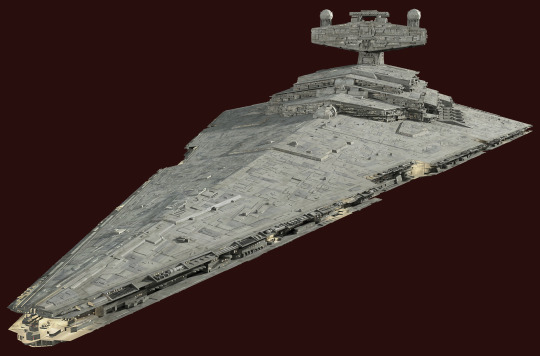
“I think the overriding factor on Obi-Wan’s ship and all of the Jedi ships… is that I wanted them to be reminiscent of the design of the Star Destroyers and the Imperial ships, because ultimately that’s where those ships grew out of: out of the former guardians of peace and justice in the universe, which were the Jedi. I didn’t particularly want - for thematic reasons - that to shift. I wanted to keep that wedge-shape design.”
- George Lucas, Attack of the Clones, Commentary Track 2, 2002
2K notes
·
View notes
Text
@david-talks-sw replied to your post “This fandom has such creative ways to say “violent religious…”
I don’t share the view, but most SW media does, except for more recent canon novels and comics. In Rebels and Clone Wars, the Jedi are explicitly stated to have lost their way, by Yoda and Ahsoka respectively, among others. In the much-read TROS novelization, (though its canonicity is… dubious) Yoda understands the Jedi were entrenched in archaic ways. TLJ Luke being like ‘the Jedi have to end’.
But TLJ set that idea up to knock it down - Luke is talking from depression and his character arc in that movie ends with him changing his mind and rejecting the things he said earlier in the movie. It may be clumsily done, but it is there.
And I don’t think survivor’s guilt is necessarily a narrative endorsement of the genocide of the Jedi. The Jedi have always been shown to be a self-critical culture, so of course the survivors blame themselves for not seeing the signs. Hindsight is 20/20 and all that. But the idea that the genocide needed to happen? I just don’t see that being promoted by most of the material, certainly not the films (which for me take precedence above all other material) not with the Order 66 scenes being played out under sad music, lingering on the shock and hurt of the victims and especially on Yoda, highlighting child victims, etc - nothing about that looks like karmic retribution or a comeuppance or anything other than a cruel and senseless slaughter.
There is a sentiment of “lost their way” in some of the expanded material, that’s true (and to an extent I disagree with it - their way was more stolen from them, not really lost, they were drafted into the war), but for that to mean that that material is trying to justify their genocide? I would hope not - with the Jedi constantly being shown as wary of their participation in the war, how are they so far “lost” as for the narrative to be saying that they “needed“ to be genocided? As if they wouldn’t have been able to, wouldn’t have wanted to shift back into the role of peacekeeper that they were suited to after the war was over? We’re not shown, at least in the material that I’m familiar with, anything so fundamentally broken that it couldn’t be fixed except by burning everything down.
219 notes
·
View notes
Note
Is there anything in that you disagree or didn't like creative choice wise in George Lucas's Star Wars?
To be entirely honest, I rarely, if ever think about how it could've been done differently, and I also draw a very thick line between discussing Star Wars as it is, and discussing criticism that one might have for it. My relationship to George Lucas' Star Wars - or any story, whether it's a movie or a novel I enjoy - is fundamentally about investigating it's development, messages, lessons, style, characters etc. so I can advance my own and other's understanding and appreciation of it. :)
17 notes
·
View notes
Text
One of the reasons why the Jedi Order is criticized is the fact that George Lucas' Star Wars actually shows that the good guys can't be always nice and you can't do perfect. The Clone Wars illustrates this masterfully: as Lucas said, "Are they going to stick with their moral rules and all be killed, which makes it irrelevant, or do they help save the Republic?" But some people are just unable to accept this.
There is always a right choice. Right doesn't mean it's the nicest and most perfect choice, the one that you might find the most satisfying and pure. But it's the best choice you can make in given circumstances. And in 99% of life, that's all we can do.
1K notes
·
View notes
Text
I don't know who needs to hear this
But no, sexual desire is not what makes us human
Neither is romantic desire
70 notes
·
View notes
Text
George Lucas’ Sequel Trilogy
Here’s what George Lucas had to say about the outlines he handed Disney, as he told to Paul Duncan, in 2019, who then reported it in The Star Wars Archives: 1999-2005. I re-ordered some quotes for coherency.
“Episode VII, VIII, and IX would take ideas from what happened after the Iraq War. “Okay, you fought the war, you killed everybody, now what are you going to do?” Rebuilding afterwards is harder than starting a rebellion or fighting the war.”
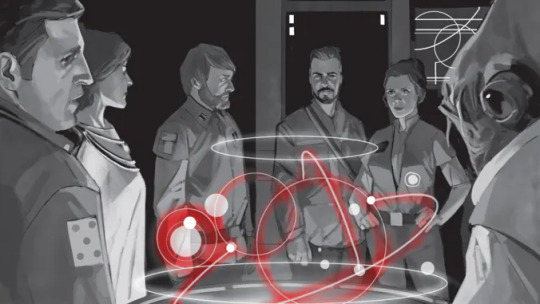
“The movies are about how Leia — I mean, who else is going to be the leader? — is trying to build the Republic. They still have the apparatus of the Republic but they have to get it under control from the gangsters. That was the main story.
It starts out a few years after Return of the Jedi and we establish pretty quickly that there’s this underworld, there are these offshoot stormtroopers who started their own planets, and that Luke is trying to restart the Jedi.”

“He puts the word out, so out of 100,000 Jedi, maybe 50 or 100 are left. The Jedi have to grow again from scratch, so Luke has to find two- and three-year-olds, and train them. It’ll be 20 years before you have a new generation of Jedi.
By the end of the trilogy Luke would have rebuilt much of the Jedi, and we would have the renewal of the New Republic, with Leia, Senator Organa, becoming the Supreme Chancellor in charge of everything.
So she ended up being the Chosen One.”
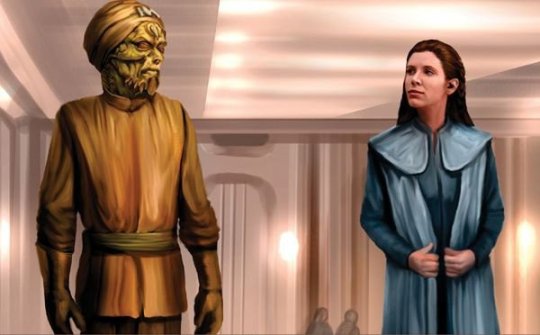
“When you win the war and you disband the opposing army, what do they do? The stormtroopers would be like Saddam Hussein’s Ba'athist fighters that joined ISIS and kept on fighting. The stormtroopers refuse to give up when the Republic win. They want to be stormtroopers forever, so they go to a far corner of the galaxy, start their own country and their own rebellion.”
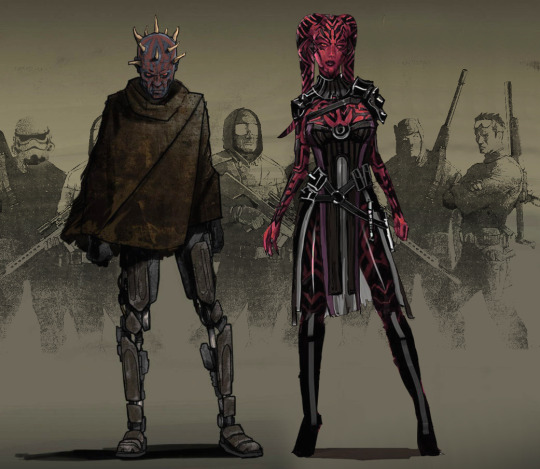
“There’s a power vacuum so gangsters, like the Hutts, are taking advantage of the situation, and there is chaos. The key person is Darth Maul, who had been resurrected in The Clone Wars cartoons — he brings all the gangs together. […] Darth Maul trained a girl, Darth Talon, who was in the comic books, as his apprentice. She was the new Darth Vader, and most of the action was with her. So these were the two main villains of the trilogy. Maul eventually becomes the godfather of crime in the universe because, as the Empire falls, he takes over.”
We also know the films would’ve been about the microcosm of the Force. It would’ve touched on the Whills and *gasp* the midi-chlorians. The dreaded M-word…!
During an interview published in James Cameron’s Story of Science Fiction, he said:
“[The next three ‘Star Wars’ films] were going to get into a microbiotic world. But there’s this world of creatures that operate differently than we do, Lucas said. I call them the Whills. And the Whills are the ones who actually control the universe. They feed off the Force.”
So that’s all Lucas said publicly about his sequels.
That said: this version was not the final outline of George’s sequels.
Like, sure, it’s very likely the draft that was given to Disney, but the point is that: it didn’t stop there.
For a short time, George helped develop the Sequels with Disney.
The treatments he had given Disney were then reworked by screenwriter Michael Arndt (who had already started discussing this with Lucas before and after he sold LucasFilm). Unclear when they were all brought in (with Arndt, after Arndt?) but eventually Simon Kinberg, Lawrence Kasdan and J.J. Abrams too also came in on the writing side of things, and restarted from scratch.
We know, from Arndt, LucasFilm Senior Content & Asset Specialist Phil Szostak, Concept Artist Christian Alzmann and LucasFilm executive Pablo Hidalgo, that by late-2012/early-2013, Lucas was still somewhat involved in the development process of the Sequels.
The book The Art of Star Wars: The Force Awakens, gives us indications and early concept art of what would’ve happened, in Arndt and Lucas’ version:
1- The character who would become Rey
The protagonist was still a female aspiring Jedi. Her name changed a lot, including Winkie, Taryn, Thea and eventually Kira.

She finds Luke, and he decides to come back from exile and train her.

2- Luke Skywalker
Speaking of which: Luke is in exile, described by Lucas as a “a Col. Kurtz type hiding from the world in a cave”, in self-imposed exile & spiritually in “a dark place”. The “why” of his exile wasn’t ever explained.
Christian Alzmann, among other concept artists, illustrated this, and one of his images (left) received a “fabouloso” stamp by Lucas.
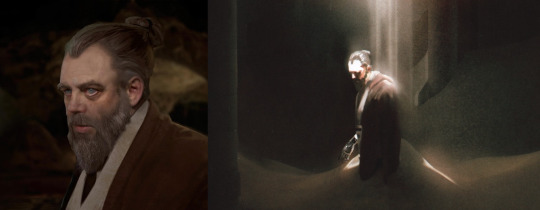
Other concept artists tried to illustrate the First Jedi Temple, some of them got approved by Lucas, such as one from James Clyne (below).
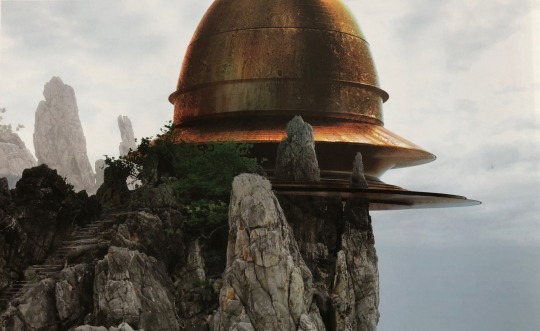
Also, Luke still died in Episode 8. In fact, that whole arc from TLJ, of Luke being exiled but being convinced by the female lead to return and get back in the fight, was already there.
The BIG difference was that the ‘exile and return’ part of that arc both happened in Episode 7, not 8. And then he would’ve died heroically in Episode 8. So instead of having Luke for one movie, we would’ve had him for two whole movies.
3- Other characters
Darth Talon was in it, aka the Jedi Killer. She seduces the son of Han and Leia to the Dark Side.
Talon worked for a big villain called “Uber” (who may have been Maul in previous drafts, or maybe even still was Maul, only under a code-name). Eventually this character became Snoke.
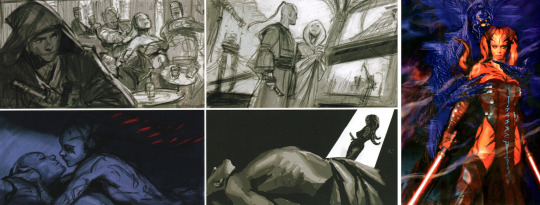
However, the son of Han and Leia would’ve turned to the Dark Side in the movies, rather than already being on the Dark Side when the first movie started.
In some versions of the story, the son was named Skylar (or Skyler), who was a tag team with Kira.
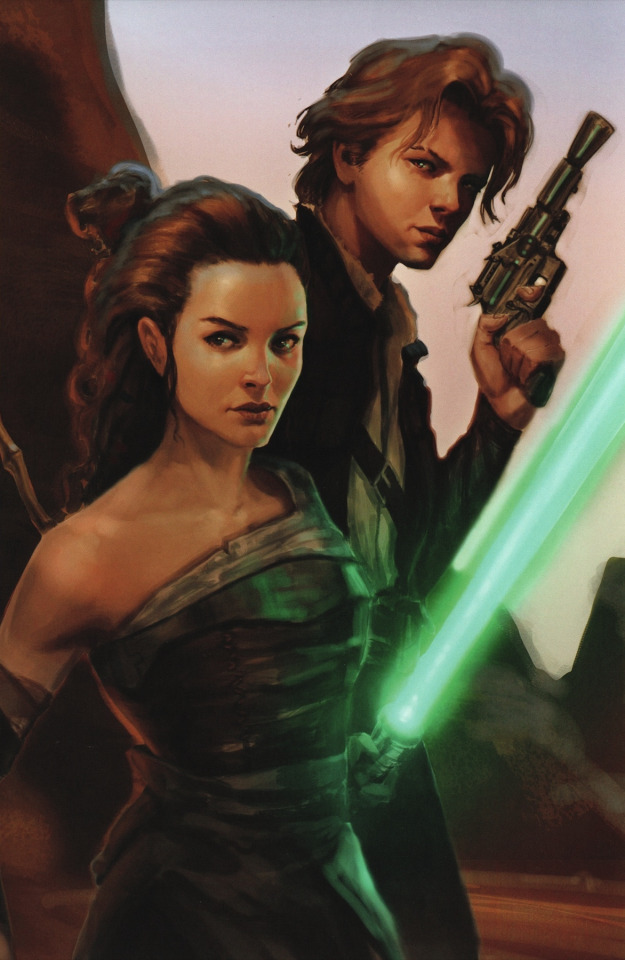
After Lucas was no longer involved, Skylar eventually developed into Finn (a scoundrel/pirate archetype that tag teams with Kira) and Ben (the son of Han & Leia), now the Jedi Killer instead of Talon.
Also, Harrison Ford told GQ Magazine that Lucas asked him to come back to play Han for Episode 7, even though Solo would die in that same episode. Whether or not Han dying was still in Lucas’ mind when he worked on the treatments is unclear.
So yeah, there were some similarities with what we actually got (Han and Leia’s child falling to the Dark Side, Luke being in exile, training an aspiring Jedi, dying in Ep. 8, Han dying in Ep. 7).
Other relevant quotes:
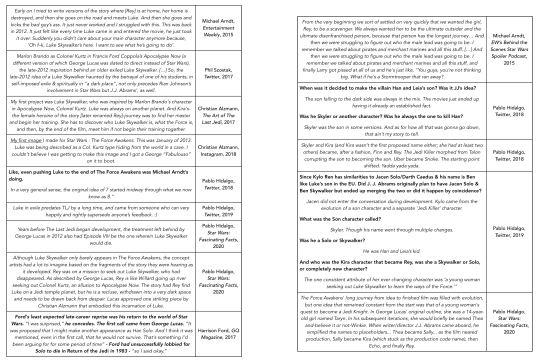
2K notes
·
View notes
Text
George Lucas: Hey, the Jedi aren’t Superman, or anything like that. They're Buddhist monks, who happen to be very good warriors.
[Lucas leaves to finish the Prequels and revolutionize cinema]
EU Writers: Let's have a Jedi say he can fly!
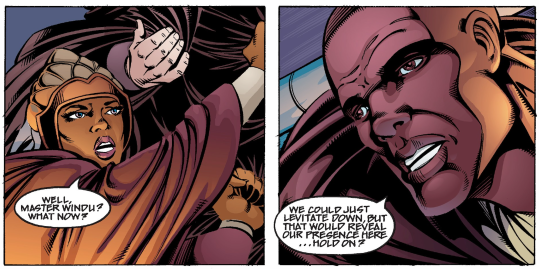
Genndy Tartavosky: Hah! Cowards!
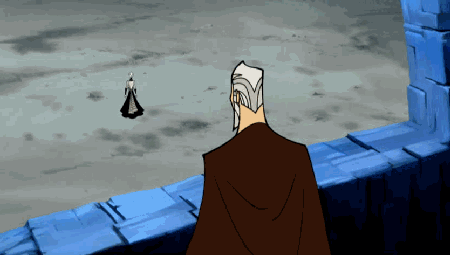
75 notes
·
View notes
Text
“Vader is 3PO disassembled.”
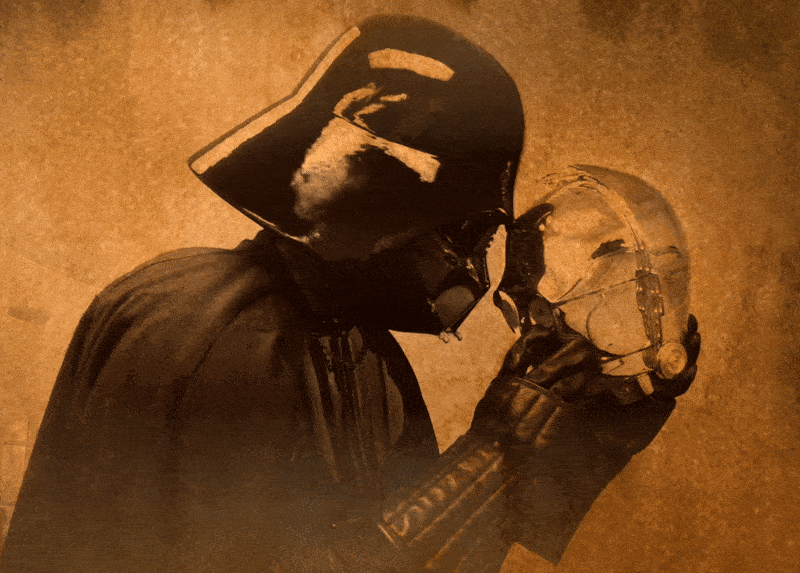
“The idea of 3PO being disassembled and then trying to get himself put back together again is a motif that is carried through with Luke and also even with Han. It’s a motif of the movies.
In this case, it’s physical. It’s a physical manifestation. In the rest of it, it’s either an emotional manifestation or a personality manifestation of somebody that sort of… ripped themselves apart and is trying to put themselves back together again.
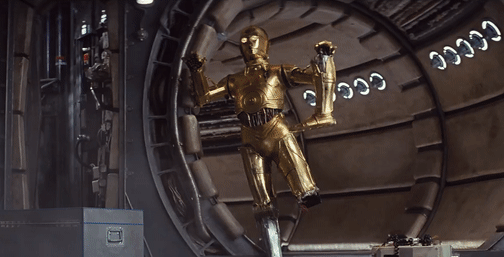
So, it’s fun when you can take a literal character - in this case, a tin woodsman or “Humpty Dumpty” - and break ‘em all apart, and then have part of the movie be about how he gets put back together again physically, which is what Luke is trying to do, what Han is doing in terms of his morality…
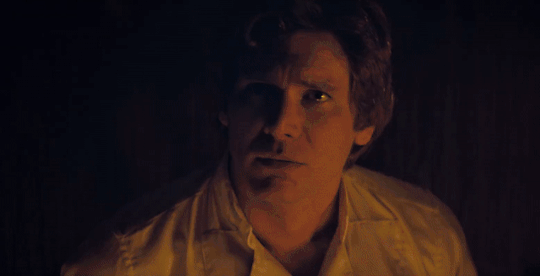
… but more importantly is what, in the end, Darth Vader is trying to do.
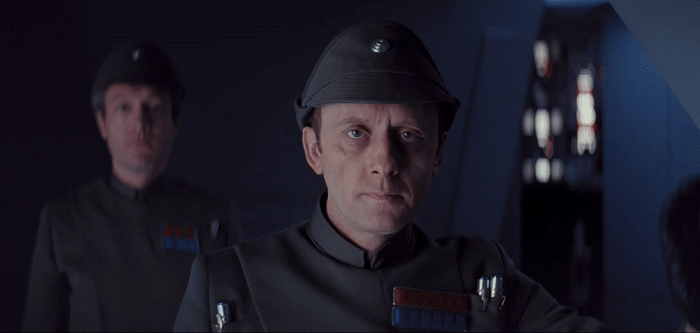
The payoff of this “Darth Vader killing his subordinates/Piett” joke is this one, where he comes down at the very end of the movie and you fully expect [Piett] to get killed and he doesn’t.
[Vader’s] too upset to even bother with killing his subordinates.
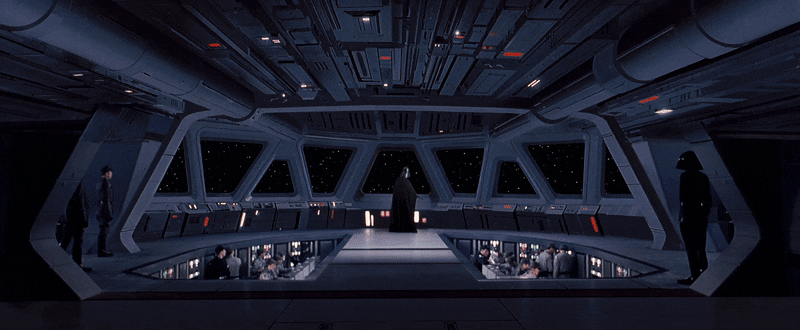
'Cause he’s really— You know, we’re talking about his son, now. So he’s conflicted. It’s not just hate anymore. There’s more to it than that. He’s 3PO disassembled.”
- George Lucas, The Empire Strikes Back, Commentary Track 1, Special Edition DVD, 2004
45 notes
·
View notes
Text
I guess the core message of George Lucas’ Star Wars is that you must realize, just because something makes you feel bad, it doesn’t mean it’s Evil; and just because something makes you feel good, it doesn’t mean, it’s Good. The good thing doesn’t always feel good and the bad thing doesn’t always feel bad. Reality is complex. Learn to live in it.
141 notes
·
View notes
Text
Something a lot more of fandom could stand to understand: While our interests are often a big part of the audience, the things fandom wants are not always what the creators see the audience wanting. I often see frustration from fandom about how this show or that show doesn’t spend more time on the emotional fallout of the action plots, why isn’t there more character exploration, it’s so obvious that’s the good stuff, why why whyyyyy isn’t there more of it?
Then I talk to my parents, who do not do fandom in any sort of way, and are watching whatever latest episodic crime show there is, and they will complain to absolute high heaven about all that boring personal crap. If a show spends too much time on the characters’ lives away from the plot or boring personal interactions, they’ll drop the show, they can’t stand that stuff. Get back to the action plots! Give them a chase scene or a crime case to solve, none of that dull as dirt emotional stuff!
No matter how much fandom has grown, there’s still a whole world outside of it that probably watches your favorite show and has massively different wants from the show than what fandom does, and sometimes understanding that the creators have to include those people in their target audience, can explain a lot and temper expectations.
443 notes
·
View notes
Photo
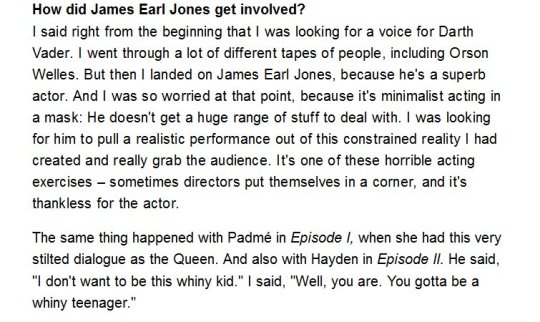
–George Lucas and the Cult of Darth Vader (x)
WELL, YOU ARE A WHINY TEENAGER, I’m dying.
4K notes
·
View notes
Text
The Jedi Order: Spiritual, not Religious
…at least in the way one may think it is.
My understanding is that when it comes to criticism against the Jedi Order as an organization, or the Jedi teachings, it’s most often grounded in a preconception about religious institutions, being linked to Western religion, church and monasticism in general, with critics frequently mentioning faith, dogma, celibacy, and tradition, and obedience, and this idea of belief in having a divine mandate, church, and teaching individuals the acceptance of doctrine from as early as birth, and the idea that Jedi Knights are viewing themselves as the hands and eyes of the divine, trusted to carry out its will.

The series of teachings given by Jedi Knights in George Lucas’ Star Wars story, encompassed by the six feature films and the six seasons of the Clone Wars, although describes a nonmaterial, spiritual reality, addresses what happens after we die, it's down-to-earth practical - it's not religious, but spiritual, built on rationality, rather than on faith and belief, holy scripture, institution, or principles laid down by an authority as incontrovertibly true, or worship of a deity, or performing rituals and prayers. Nor there is any mention that a Jedi Knight is supposed to take a vow of celibacy, or that they hold themselves to be knowers or messengers of the will of the Force, or that they have a belief system that they institutionalized as a political and social force. It's about us, our minds, and our and other's well-being - it's about being, rather than believing.
Understanding the Force and its ways
The spiritual reality in George Lucas' Star Wars is, the Force: it's life itself, a metaphor for God and for a belief in God; it was based on a concept of the transcendent reality Lucas himself believes in, and it was designed to awake a sense of spirituality in young people. It's life itself, encompassing, but also going beyond the individual life forms.

When one is alive, through their vessel of crude matter, the universal life force, consciousness, spirit, soul circulates, bringing them the experience of individual, separate life, composing individuality and persona. When one dies, the Force recedes from this vessel, and all that one is - life force, consciousness, spirit, soul, self, everything - is rejoining with the entirety of the universal Force, that is all-powerful, creator, destroyer, governs everything and sets destiny. Knowing the ways of the Force is knowing yourself and knowing reality.
Behind all evil, there is always fear
In the first trilogy, Obi-Wan "Ben" Kenobi identified the culprit behind Darth Vader's fall and evil actions: the dark side of the Force. As Yoda revealed, “Anger, fear, aggression… the dark side of the Force are they”, and giving in to hatred led to a life loved on one's dark side. Luke Skywalker relied on these teachings in Episode VI, when he recognized, his dark side is leading him on a path that ends in Darth Vader's armor. He refused to give in to it, and he was able to redeem his father by relying on love, compassion, generosity and hope.
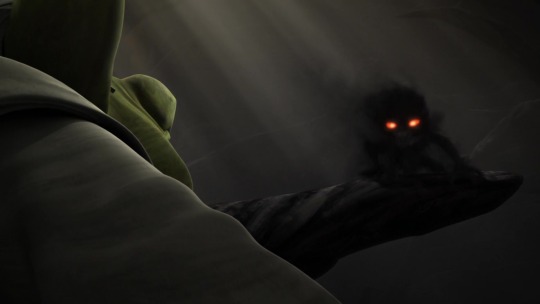
How these feelings and emotions are arising and functioning in our lives is explored in the second trilogy. As Yoda explained to Anakin Skywalker, "fear is the path to the dark side" because "fear leads to anger, anger leads to hate, hate leads to suffering." In other words, when we hate someone or something, behind that, there is always anger toward and fear from them, and behind anger, there is always fear. And fear, anger and hate are leading to suffering. Especially the fear of loss, that Yoda sensed Anakin in Episode I.

It's important to notice that although it's not spelled out directly until the Clone Wars, in Star Wars, "evil" is not a characteristic that some beings just are, and it's not a wicked, dark, fully Evil and malicious entity that tries to seduce and corrupt fallible human beings. Rather, it's actions, and effects of those actions, motivated by the dark side of the human condition: "some in [our] existence calls [it] evil, otherwise known as fear."
Training the mind: living mindfully
"Be mindful of your feelings" and "thoughts", the development of the "most serious mind" are important parts of Jedi practice. Mindfulness is the simple act of paying attention and noticing and being present in whatever you’re doing. When you are being actively mindful, you are diligently aware, mindful, and attentive, you become aware of the world around you, the effects that you have on others around you, as well as your thoughts, feelings, emotions, behaviors, movements, and their effects on you. In other words, mindfulness is the awareness that arises through paying attention, on purpose, in the present moment, non-judgmentally.

This is when the mind is "calm, at peace, passive", so one can "know the good side [of the Force] from the bad", that is to be able to see things as they are, not just as they appear to be in the light of our heated emotions. Thus, it's possible to be like Master Yoda: "Part of me you are, yes. But power over me you have not." he says firmly to the reflection of his own "evil." "Through patience and training, it is I who control you. Control over me you have not. My dark side you are. Reject you I do." Then, one can respond with spacious clarity, purpose, firmness, and compassion.
Letting go of possession and attachment
Everything we can think of - all things and beings - is changing, constantly moving through our lives, and we ourselves, our very existence changes, life itself is moving through us, as we come into this world, and, ultimately, leave it. As Shmi Skywalker explained, "you can't stop change any more than you can stop the suns from setting." Thus, attachment - love or liking for someone or something, infused with resistance to lose, and the feeling that we would be unhappy without them, the desire to hold on to things - should be ceased, for it's forever walking hand in hand with the fear of loss. Attachment has the "I" in the focus; "Others" are the sources of happiness, fulfillment, satisfaction, which are possessable.

"Train yourself to let go everything you afraid to lose" is training ourselves to see through the inevitable cycle of life and loss, and to gain awareness of the impermanent, transient nature of all things and beings, so we won't grasp, grab, or cling or hold on to transient things through our desire to stay in our lives and not to change.
Living on compassion: the joy of being a Jedi
Pleasure is one kind of happiness, driven from the fact that there is something in your life that brings you enjoyment. Like a sunset, a great meal, a great music, great sex, or good weather, a good book, or the enjoyment of seeing your children growing up. And there is also the pleasure of having a loving, kind, warm person in your life. There is the pleasure of having enough to eat, a place to live, having medical care, clothes to wear, having education. So, pleasure is happiness at the sensual, physical, material level. Pleasure is great. However, we must be aware of the fact that our attachments are formed to pleasures, to the sources of pleasure, and accept that pleasure, just like its resources, are temporary, thus, our happiness based on them is short-lived. Otherwise, we end up in a cycle of greed: we want, we get, while being afraid of not getting, and when we have, we're afraid of losing, with anger, hate, aggression, bitterness thriving on our fear, robbing us from happiness.

On the other hand, there is another form of happiness, that is joy: satisfaction, happiness arising on the mental level. This mental joy, contrary to pleasure, sustains itself, thus, it's everlasting. This is the merit of compassion: genuine love and affection for others. By definition, compassion means to suffer with, to experience with, to feel with another person - a sense of oneness, innate connectedness with other. There is a sense of being parts of each other: just like when you hurt your finger, and you don’t think, "Oh, my finger is hurt, maybe I should help it", but rather, there is an instant and intuitive, natural response to it, the individual’s quest for happiness and to avoid suffering is completed by and merged with the happiness and the freedom from suffering of the other. If you're filled with negative judgment, anger, hate, fear from others, then you will feel separate from others, and you will feel lonely, even in the middle of a crowd. If you have an open heart, if you have compassion, you will never feel lonely, even if you are alone. Genuine, selfless concern for other's well-being, cultivating close, warm hearted feelings are putting the mind at ease, creating the peace of mind, and the more we care about other's well-being, the greater our own sense of well-being becomes.

And regardless what view we might hold about what will happen to us after we die, if we have compassionate love for our loved ones, compassion will defeat death. Regardless how we think about an "afterlife" - nirvana, going to heaven, being reborn, or, if we are materialists, dispersing and becoming other things in the universe, or becoming one with the Force - with compassion, no matter where or what our loved ones are or become, our love for them will never cease, nor a sense of oneness with them, nor our happiness.
As long as you have compassion, you won't be afraid.
Monastic lifestyle and growing up in a Temple
Living in a temple, not pursuing romantic or sexual relationships, as well as being a member of a monastic order are not requirements to follow the philosophy I outlined above. At this point, we must take the fact, the Jedi Knights were designed to be mythological heroes in George Lucas' Star Wars, into account. As Lucas says, the Jedi were "designed to be a Buddhist monk" - Buddhist monasticism is about focusing entirely on spiritual development on the Buddhist path, to cultivate mental happiness and wisdom about the nature of reality. By doing so, one preserves the spiritual tradition by living it and studying it, as well as teaching it to others. Monastic living is not for everyone, nor it's a necessity, but it's very useful to avoid getting attached to pleasures and getting distracted from the goal.

A Jedi Knight leads a monastic lifestyle for practical reasons - ideas, such as being separated from worldly pleasures to focus on loving God or to seek God's approval, or considering pleasures sinful from which the body must be pure, are not playing any role here. The reason why younglings are leaving their homes, families, is to start their Jedi training as early as possible: to cultivate insight into the impermanent nature of reality, to train their mind to not to base their happiness on pleasures, to cultivate compassion. As George Lucas expressed, a Jedi Knight must raise above of average human tragedy and overcome the flaws that we all carry in ourselves and making us humans. But he always emphasized, this cannot happen without training and diligence, just like in real life, and in the real life, it's most often a life-long quest. The other part of the training is learning how to use the Force flowing within and around them.
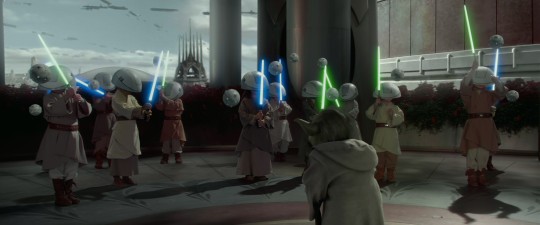
The Jedi Knights are monk-warriors, committed themselves to guide the galaxy, to protect and preserve peace and justice in the universe. As George Lucas explained, the Jedi Knights "were never designed to be a superhero or anything like that. They were designed to be a Buddhist monk, who happened to be a very good warrior. And they became the peacekeepers of the human world." They aren't policemen, soldiers - they are "monks first, and they try to convince people to get along." They're "ultimate father figures" and "intergalactic therapists" and "warrior-monks who keep peace in the universe without resorting to violence." When they have to use violence, they do, but they're diplomats on the highest level.
A Jedi is about Being, not Believing
If we define religion as a philosophy that posits an ultimate reality, providing a path to experience that ultimate reality, and the potential for personal transformation, then, yes, the Jedi Order is a religious institution, and Jedi philosophy is a religion. However, if we define religion as faith, unquestioning acceptance of doctrines that are laid down by an authority as incontrovertibly true, receiving revelations from a deity or a spiritual reality, involving worship, rituals, clergy and prayers, and the aspiration to build a connection with a deity, then, a Jedi Knight and the Jedi Order is not religious at all - the Jedi way is a relationship to the self, to others and reality.
I would also recommend my two other essays on the Jedi Order:
The Real Jedi Order
The Jedi Order and the Galactic Republic
I would like to tag @allronix ; although this post is not answering directly to their points in our amazing discussion (here, here and here) we have, I realized, if I am trying to write one post to that does justice to my pro-Jedi perspective, that will be titled "my response to Allronix - a novel", and that would be way too long. This one, I hope, clarifies my position on some very important things about my perspective, and will clear the way for my reply, although I am sure there will be some more.
I ask for your patience, I thank you for our debate, and I thank you if you read this!
391 notes
·
View notes